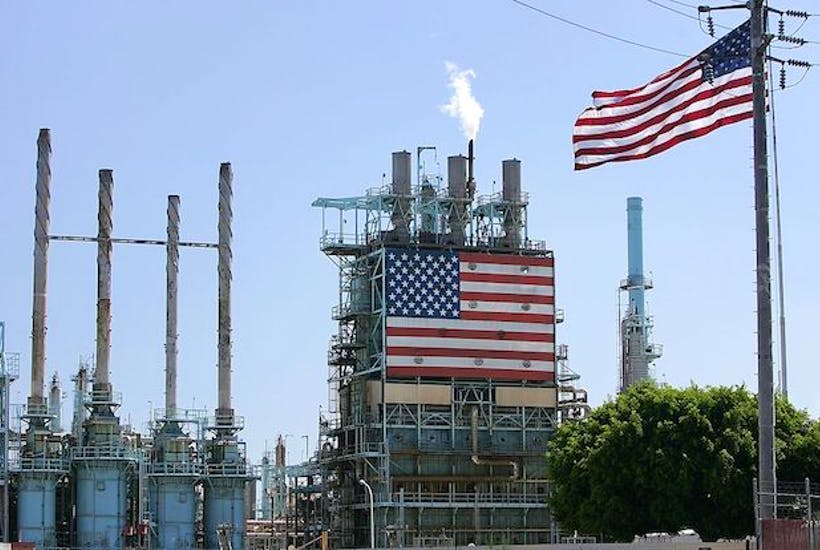Not so long ago, you could judge the stability of the Middle East by looking at the oil price. Now: not so much. In the last week, we’ve seen American drones kill an Iranian general and Tehran fire missiles at two American bases in Iraq, yet the price of oil remained relatively stable. It climbed four percent on Tuesday evening, when there was talk of all-out war, but it settled back down throughout the week. Given how much oil used to dominate foreign affairs — and how its price served as one of the first major indicators of global conflict — it’s worth looking a little more at this dog that didn’t bark.The 2003 Iraq war was seen by critics (and some supporters) as an attempt made by America to secure stable oil production. From wars to partnerships, America’s reliance on oil imports has dominated our conversations around Middle Eastern policy, or helped to explain why the ‘land of the free’ would cut deals with the brutal Saudi regime and others. But over the last decade, things have changed, utterly.The US now boasts about being ‘energy independent,’ thanks to its substantial investment in fracking, and the boom in shale over the past five years. Whether it’s really independent or not remains up for debate, but one thing is clear: domestic US oil production is surging. All this extra American oil has come on to a market already well-served; Saudi Arabia, Russia and other suppliers continue to pump out oil, which has led to an imbalance in global demand, with the cost of oil falling as a result. But most importantly, America is now a net exporter of oil.While previous conflict and uncertainty in the Middle East would have immediately resulted in an oil price spike, the picture is changing for a variety of reasons. The prevalence of this new US oil is one of them. Uncle Sam’s new-found freedom could change international relations substantially — and quickly. A sitting president, for example, could not have even considered pulling US troops out of Iraq five years ago (as Donald Trump pondered doing just this week) when access to foreign oil remained so crucial to the US market. America’s interests in the region may sway (or wane), along with its pseudo-tolerance for human rights abusers like Saudi Arabia. Its entrenched presence, including the use of the Navy Fifth Fleet to patrol places like the Persian Gulf, could also be reconsidered.As America grapples with its role in the world – and presidential candidates line up to debate their variety of hawkish and isolationist stances leading up to November 2020 — it’s becoming increasingly clear that its options are far more wide-ranging, now that it is increasingly in control of its own energy market. It can afford to distance itself from the Middle East, if it wants to do so. And it’s been hinted at: as Trump said recently about the Kurdish conflict — ‘I hope they do great, we’re 7,000 miles away.’Oil may continue to be one of the world’s most important commodities for the foreseeable future, but America is less dependent on the oil that comes out of the Middle East than at any point in modern times. And as this week has illustrated, the players who wield its power are changing by the day.This article was originally published onThe Spectator’s UK website.
All this extra American oil has come on to a market already well-served; Saudi Arabia, Russia and other suppliers continue to pump out oil, which has led to an imbalance in global demand, with the cost of oil falling as a result. But most importantly, America is now a net exporter of oil.While previous conflict and uncertainty in the Middle East would have immediately resulted in an oil price spike, the picture is changing for a variety of reasons. The prevalence of this new US oil is one of them. Uncle Sam’s new-found freedom could change international relations substantially — and quickly. A sitting president, for example, could not have even considered pulling US troops out of Iraq five years ago (as Donald Trump pondered doing just this week) when access to foreign oil remained so crucial to the US market. America’s interests in the region may sway (or wane), along with its pseudo-tolerance for human rights abusers like Saudi Arabia. Its entrenched presence, including the use of the Navy Fifth Fleet to patrol places like the Persian Gulf, could also be reconsidered.As America grapples with its role in the world – and presidential candidates line up to debate their variety of hawkish and isolationist stances leading up to November 2020 — it’s becoming increasingly clear that its options are far more wide-ranging, now that it is increasingly in control of its own energy market. It can afford to distance itself from the Middle East, if it wants to do so. And it’s been hinted at: as Trump said recently about the Kurdish conflict — ‘I hope they do great, we’re 7,000 miles away.’Oil may continue to be one of the world’s most important commodities for the foreseeable future, but America is less dependent on the oil that comes out of the Middle East than at any point in modern times. And as this week has illustrated, the players who wield its power are changing by the day.This article was originally published onThe Spectator’s UK website.
Why trouble in the Middle East no longer means an oil price hike
America is less dependent on the oil that comes out of the Middle East than at any point in modern times

Not so long ago, you could judge the stability of the Middle East by looking at the oil price. Now: not so much. In the last week, we’ve seen American drones kill an Iranian general and Tehran fire missiles at two American bases in Iraq, yet the price of oil remained relatively stable. It climbed four percent on Tuesday evening, when there was talk of all-out war, but it settled back down throughout the week. Given how much oil used to dominate foreign affairs — and how its price served as one of the first…

















